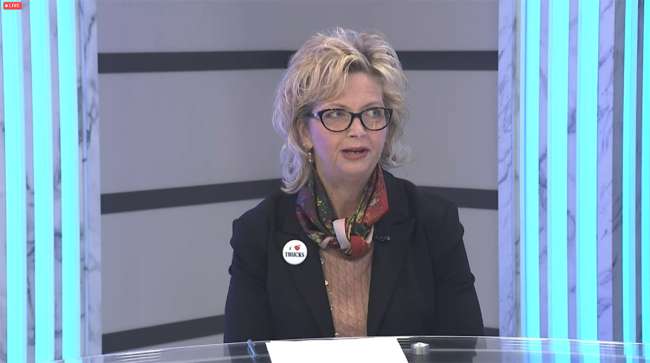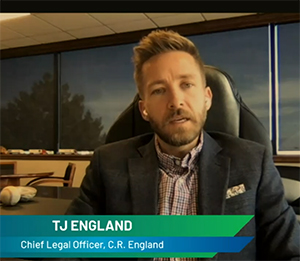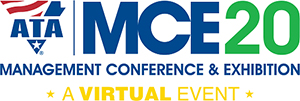Staff Reporter
Trucking Representatives Talk Silver Linings, Lingering Problems Amid Pandemic

[Ensure you have all the info you need in these unprecedented times. Subscribe now.]
Although the coronavirus pandemic has presented numerous challenges, it has also allowed transportation companies to find ways to improve, especially in terms of communication, according to trucking industry representatives.
Sherri Garner Brumbaugh, president of Findlay, Ohio-based Garner Transportation Group, said communications at her company have improved during the pandemic. Besides taking extra precautions to clean trucks, Garner Brumbaugh said her team increased updates to drivers, many of whom wanted to know what (and how) the company was doing amid the pandemic. Garner Brumbaugh, who also is American Trucking Associations’ incoming chairman, spoke during a panel discussion Oct. 27 as part of ATA’s virtual Management Conference & Exhibition.
T.J. England, chief legal officer for C.R. England Inc., said his company’s virtual town halls have given him and his teammates the opportunity to hear from more drivers. Headquartered in Salt Lake City, C.R. England specializes in refrigerated services.
During the second week of March, Joseph Metzger, senior vice president of transportation for Walmart, said his company started doing daily “stand-up meetings” with truck operators to learn what they needed, a practice that continued for months.

England (Transport Topics)
“It was ‘Do whatever it takes so we can take care of our drivers,’ ” Metzger said.
When the pandemic hit this spring, transportation groups faced a slew of challenges. Metzger said Walmart juggled demands for toilet paper, paper towels, hand sanitizer and groceries with measures to keep drivers safe, such as maintaining distance when dropping off freight. He recalled a meeting he had with his team in early April during which one person said the pandemic was “like 20 hurricanes all at the same time.”
Garner Brumbaugh said, at the start of the pandemic, her company focused on finding the best information about how to respond to the coronavirus and securing personal protective equipment for drivers. She said her human resources director stepped up to the task of writing procedures and policies regarding guidelines on face coverings and temperature checks.
On the road, truckers dealt with shuttered rest areas, such as the ones that closed in Pennsylvania in March due to safety concerns. John McKown, a professional driver for UPS Freight who runs through Pennsylvania every day, said the rest area closures were a major challenge. Because he’s home every night, McKown packs his own lunch. However, he said he has a friend who is gone for days at a time and counts on places to stop in order to eat. The trucking industry’s response to the closures was swift, and the rest areas eventually reopened.
“The cry went out and the cry went strong, and the drivers were great in providing information and they were respectful and it got changed,” Garner Brumbaugh said.
Corporate planning extended beyond the needs of drivers. England said that his company’s management team actively started planning in February for how a shutdown could impact office operations. The team developed a teleworking strategy so nearly 1,000 employees could work from home. Identifying a silver lining, England said it was good most employees were working from home when an earthquake shook Salt Lake City on March 18.
The panelists identified the public’s new level of appreciation for truck drivers as one positive aspect of the pandemic. England said some customers assembled care packages for his company’s drivers. McKown said signs displaying appreciation for truckers on his dispatches have a positive effect. He said troopers have saluted him as he passes by.
McKown, who serves as an ATA America’s Road Team captain, compared his role as a driver to that of a foot soldier. He said the “shield” on the side of his truck displays who he works for and that, when the pandemic hit, truckers stepped up no matter what was written on their shields.
“We are the trucking industry,” McKown said. “When bad things happen, we step up. Tell me where to take it, tell me how to get there and I’ll do that.”
Although the trucking industry leapt to respond when the pandemic hit, lingering challenges remain. One such challenge is getting drivers permitted and tested, England said. Many states have had to adjust and restrict vehicle service department activities due to the pandemic, which can complicate a person’s path to the trucking industry.
Comprehensive infrastructure legislation is another issue that remains, McKown said. During his industry address Oct. 26, ATA President Chris Spear said the federation will continue to work with lawmakers on an infrastructure package.
“We’ve got to continue to fight for that infrastructure,” McKown said. “The roads and bridges need a lot of work.”
Want more news? Listen to today's daily briefing:
Subscribe: Apple Podcasts | Spotify | Amazon Alexa | Google Assistant | More


